 It’s Day 3 of a solo cycle ride that I have challenged myself to complete through north-west Vietnam. Today there’s 64 km to take me from the delightful village of Mai Chau over the hills to Moc Chau township. I am pedalling up through some of the world’s most stunning scenery: emerald green rice paddies sculpted into the very structure of the hills, grazing water buffalo, valleys of meandering rivers winding around starkly beautiful towering karst limestone pinnacles. And yet, ever-present in my thoughts is the sobering global destruction to our common web of life wrought by plastic packaging.
It’s Day 3 of a solo cycle ride that I have challenged myself to complete through north-west Vietnam. Today there’s 64 km to take me from the delightful village of Mai Chau over the hills to Moc Chau township. I am pedalling up through some of the world’s most stunning scenery: emerald green rice paddies sculpted into the very structure of the hills, grazing water buffalo, valleys of meandering rivers winding around starkly beautiful towering karst limestone pinnacles. And yet, ever-present in my thoughts is the sobering global destruction to our common web of life wrought by plastic packaging.
Roadside grazers, cattle, buffalo and goats, pick between dusty plastic litterings in their search for grass. I stop for a breather and attempt a photo to share the beauty of this journey with others, but plastic detritus owns the foreground. And each discarded plastic water bottle, plastic bag and empty food packet I pass transports me back to an afternoon 3 weeks ago in my home town of Paihia.
That warm Saturday afternoon, I was one of a team of twenty volunteers picking up roadside litter along the highway into Paihia. With hi-vis vests and a sense of connection to both our community and the place we love, we bent to the task. What we collected varied in size and shape. There were bottles, takeaway containers, disposable cups, crisp packets, wet wipes, nappies, yet there was consistency in their composition, the single-use plastic detritus of modern life. A mere 3 km stretch yielded 31 bags which made for a sense of achievement as we loaded the bags to be taken to a landfill, many miles distant. Despite the insignificance of our task given the tally of other local roadsides similarly calling out for our loving care, “At least all this rubbish won’t now be washed down in the next rain to become pseudo food for Bay of Islands coastal fish and seabirds,” we tell ourselves proudly.
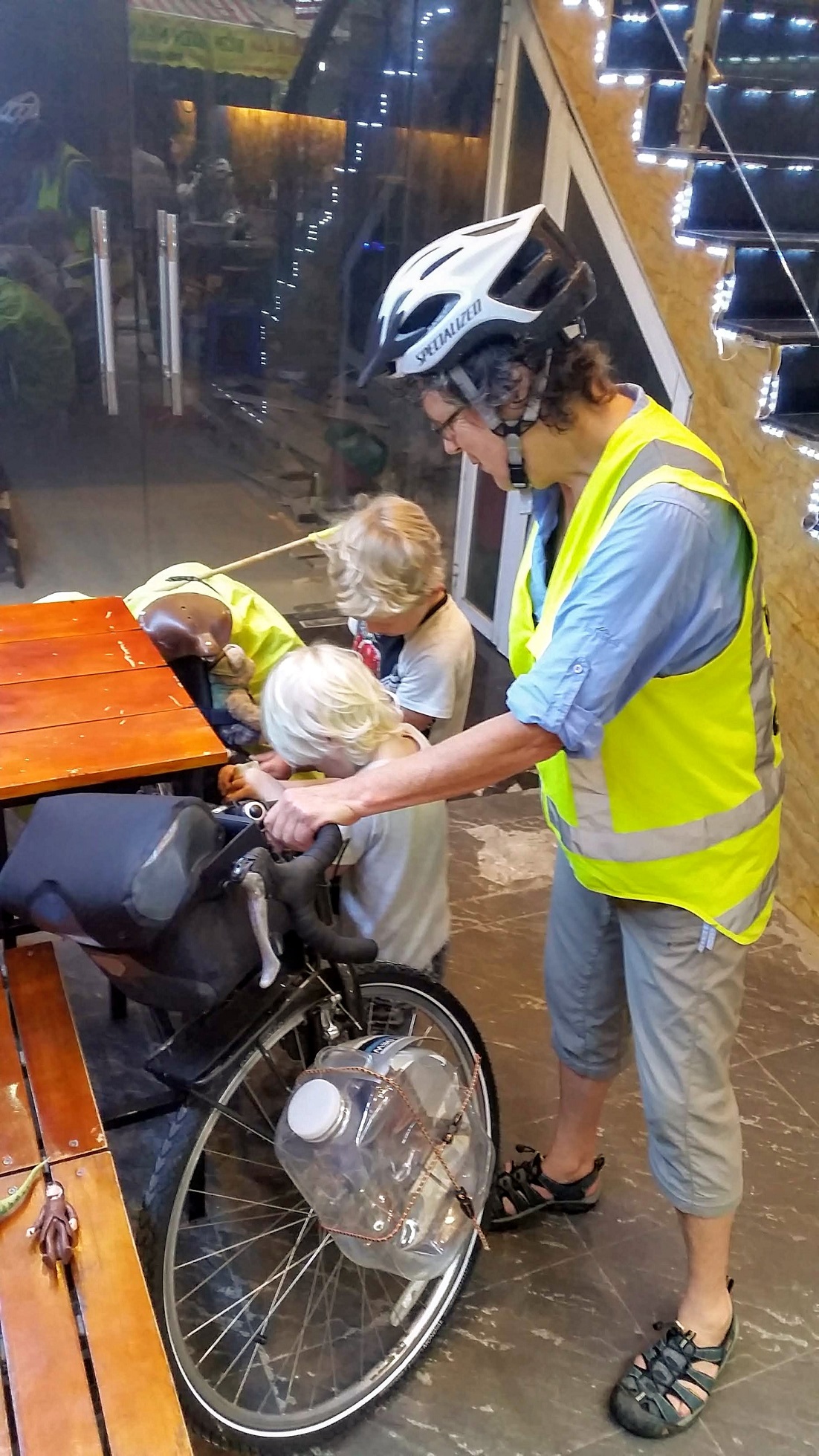
Here in Vietnamese hill country, by 10am today’s heat is palpable and wearying. I am conscious of my ‘patent litter gulper’, a recycled plastic water container bungee-corded, as you can see, to the front frame. As a ‘Zero Waste Granny’, its part of my daily discipline to honour marine life by seeking out and picking up 10 pieces of litter. Today there’s certainly plenty on the roadside to choose from, perhaps more than back home; at any rate it’s less concealed on these dry dusty roadsides. As I pedal along, what comes to mind is the Lewis Carroll poem, ‘The Walrus and the Carpenter’ that I introduced to my grandsons at Halong Bay’s beach last week. “If seven maids with seven mops swept it for half a year, do you suppose”, the Walrus said, “That they would get it clear?” “I doubt it,” said the Carpenter, and shed a bitter tear.’ So too with plastic trash, and yet when it comes to my litter gulper, today I’m stumped. Picking up 10 pieces of rubbish today is not the problem; ‘What will I do with it afterwards?’ is.
After 3 days cycling, it’s obvious this fascinating nation is an icon of rapid economic growth. Everywhere new building is taking place, with cement factories outside every town, plasterers at work on rickety bamboo scaffolding, ultra-glossy mobile phone stores and ubiquitous motorbikes, transporting whole families or weighed down with piled-high goods. I have read that 80% of the population own a motorcycle, and 2 days ago as I cycled out of Hanoi, it seemed every single one of them was on the road with me, headed alongside in the same direction, or countering the flow with pragmatic shortcuts. It feels a vibrant and exciting place yet such tremendous growth is coming at a cost. Hanoi was noted in 2016 as having the second worst air pollution in the world: in the 3 days I was there, never once did the sun penetrate the smog.
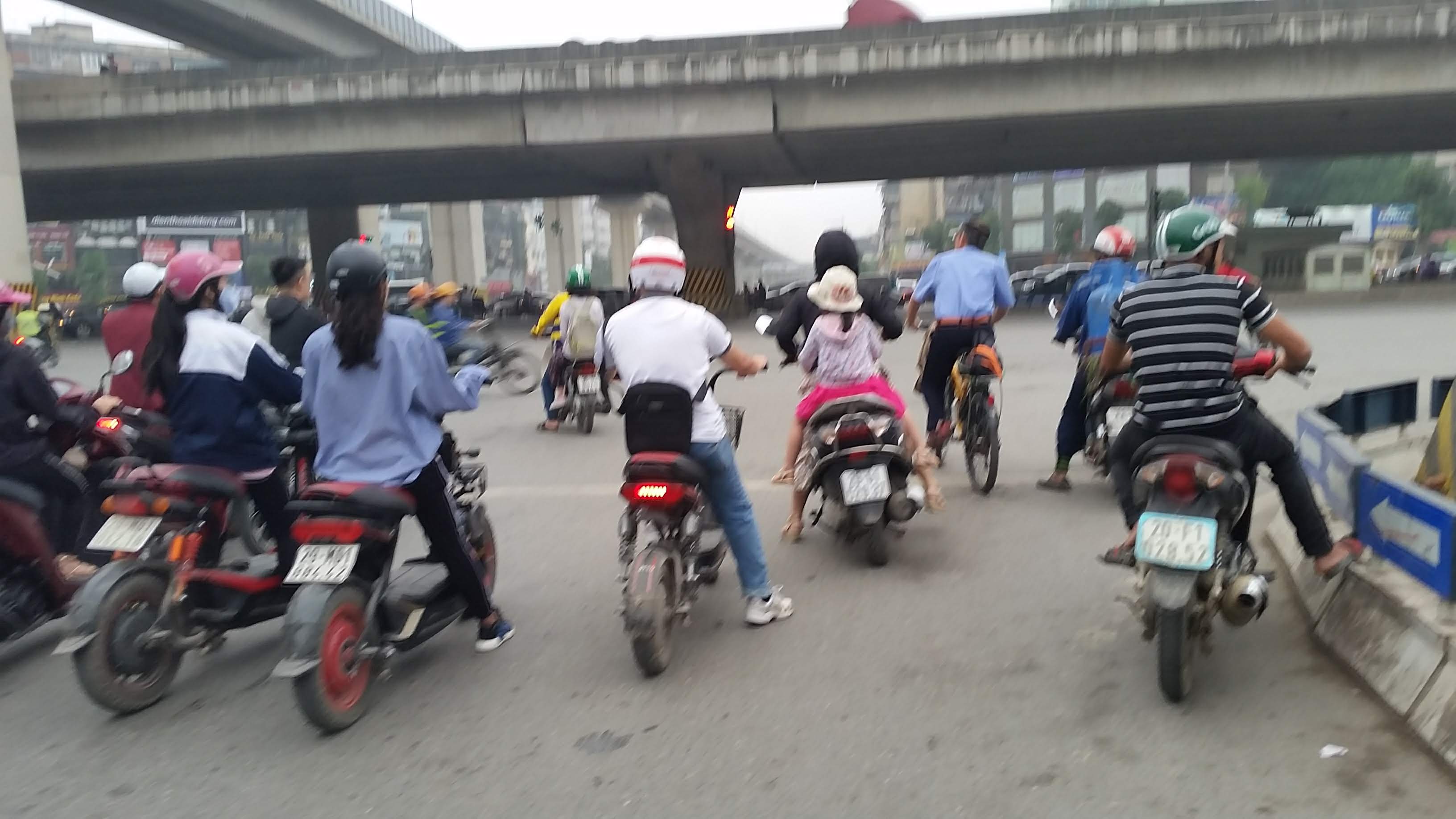
It’s not only the air that is polluted. A brief internet dive highlights issues of waste, so very obvious here, that I feel called to understand:
- ‘In 2015, Vietnam was named fourth out of five countries that dump more plastic into the oceans than the rest of the world combined.’
- ‘On April 19, the Consulate General of the United States in Ho Chi Minh City held a seminar discussing the gravity of ocean pollution in Asia. Experts at the seminar produced appalling statistics which state that nearly 18,000 metric tons of plastic waste are generated in Vietnam every day. This finding indicates how desperately Vietnam needs to adopt major changes in consumer and business behavior to avoid becoming a giant landfill.’
- ‘The big Vietnamese cities all have waste collection systems, but in rural areas, only 40–60 percent of trash ends up in landfills.
And it is in that final statistic that my dilemma lies today. If I pick up trash, where will I then put it? I leave in the cool of the early morning and in the rural villages, grandparents mind toddlers while they sweep spotless front yards, tend tiny roadside herb gardens and water the dust. Yet amongst such care and tidiness, discarded plastics litter the roadside drains and verges. Here and there, a half-burnt pile of plastic waste demonstrates an attempt to look after the Commons, but it is clearly the task of Sisyphus, best ignored in the immediate needs of daily survival. 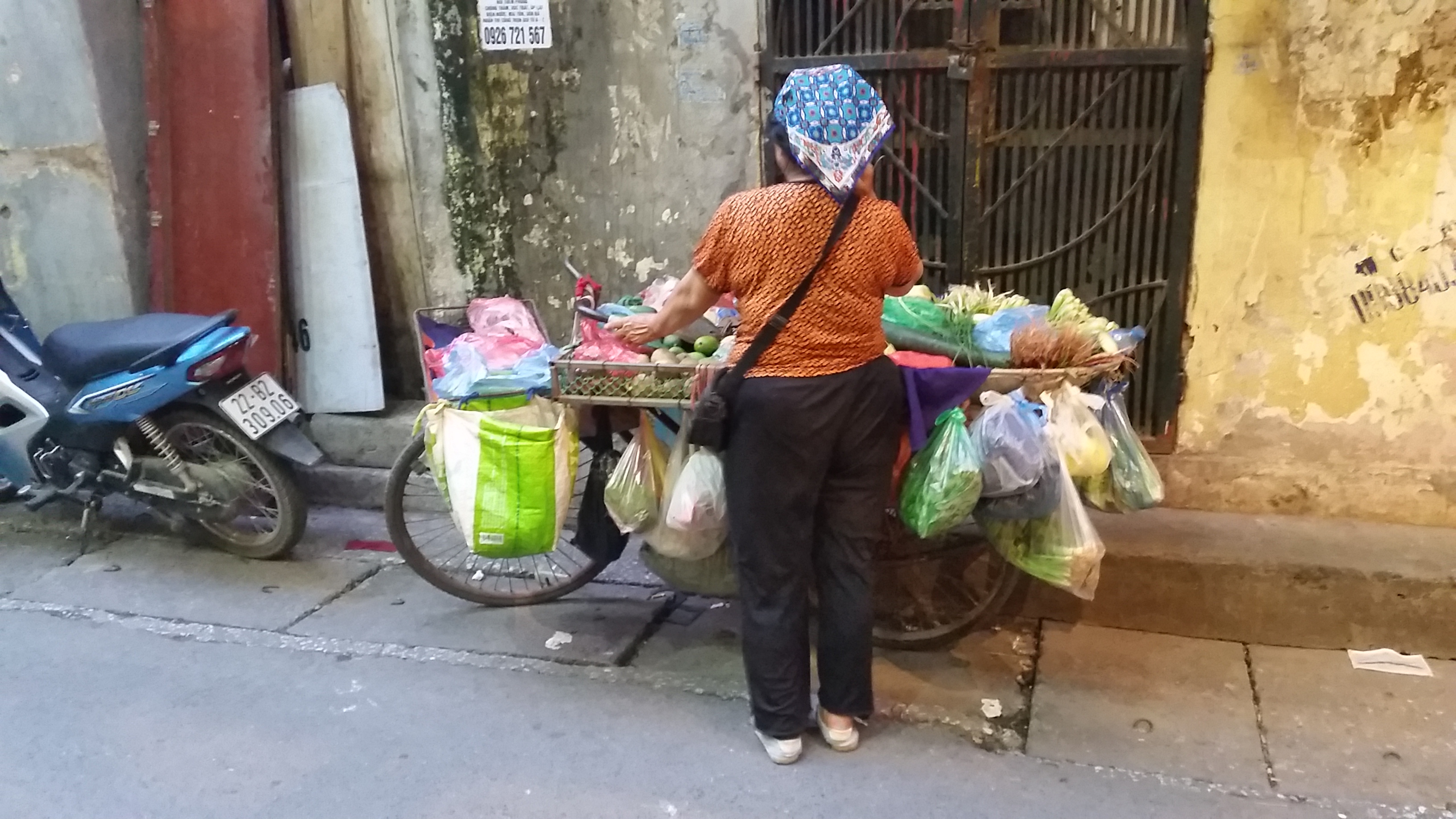
I am conscious that back home in New Zealand, out-of- sight landfills make us complacent. Relying on a council pick up, we just ‘throw things away’, forgetting that we simply bury the toxicity deep in Papatuanuku / Mother Earth. Here in the Vietnamese countryside, nothing is hidden. So today my litter gulper remains empty, for who am I to burden this evening’s guest house owner with extra rubbish? I arrive late into Moc Chau, a small rural town. Heading out in search of a restaurant, I return to my room after dark, wildly swinging my backpack as I ward off an increasingly loud and confrontational pack of dogs. Yet even in the dark it’s been all too clear that nowhere is there an easy ‘away’ into which stuff can be thrown.
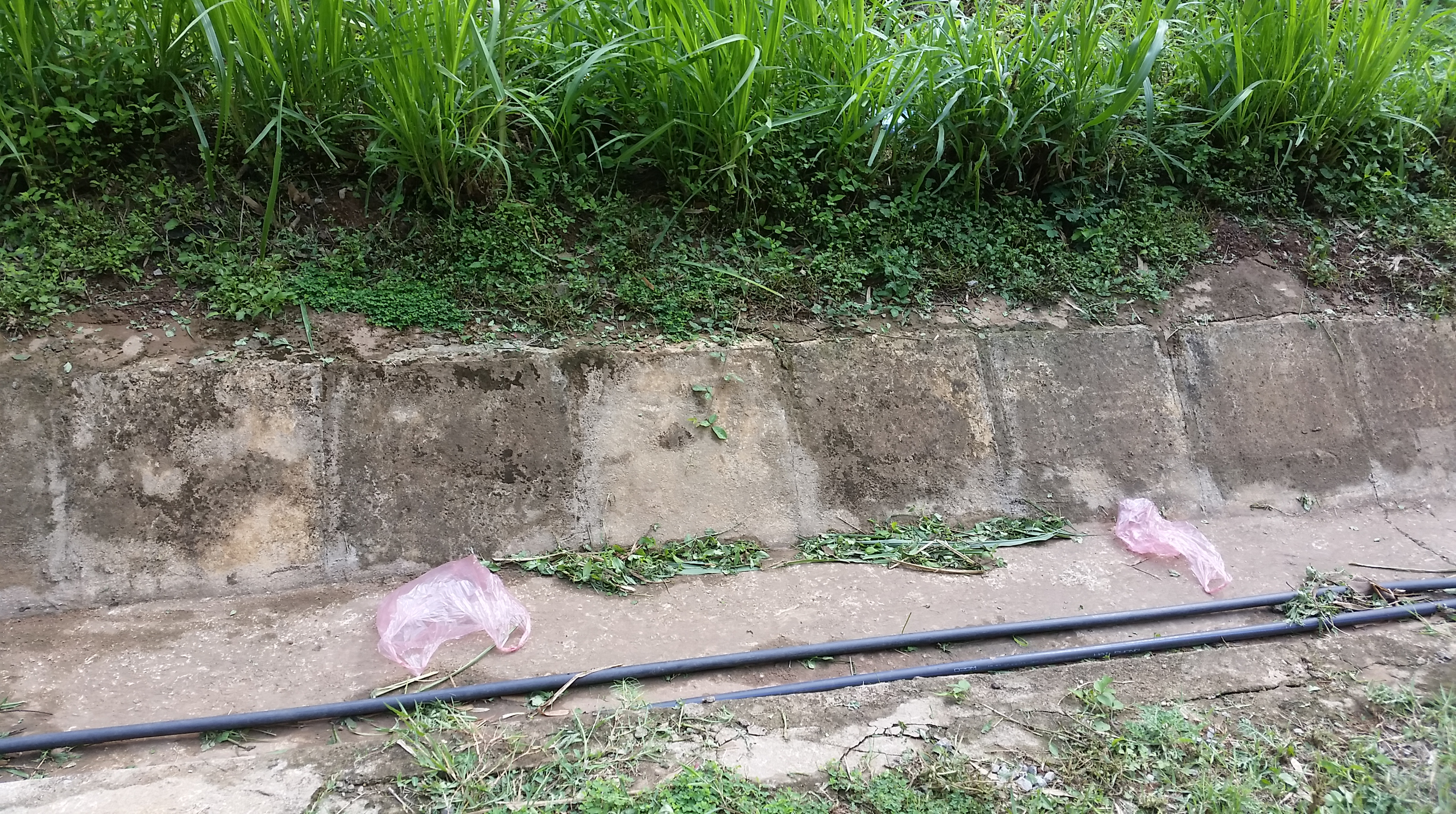
Perhaps it belongs in another story, for it’s not until a further 650km and 10 days have passed, that only 10km from my final destination of Luang Prabang in Laos, I gain a new perspective. My 2 small grandsons leap out of a car returning their family to town after a homestay. “Graneee”, they call as they race towards me with a long-awaited and re-uniting hug. Then they inspect my bike. “Why’s there no rubbish in here?” they say, and immediately scout around, unheeding of parental concerns, helpfully picking up plastic straws, bottles and bags to post through the litter gulper’s jaws. It’s clear they have no qualms that with their help, I can get this litter problem sorted.
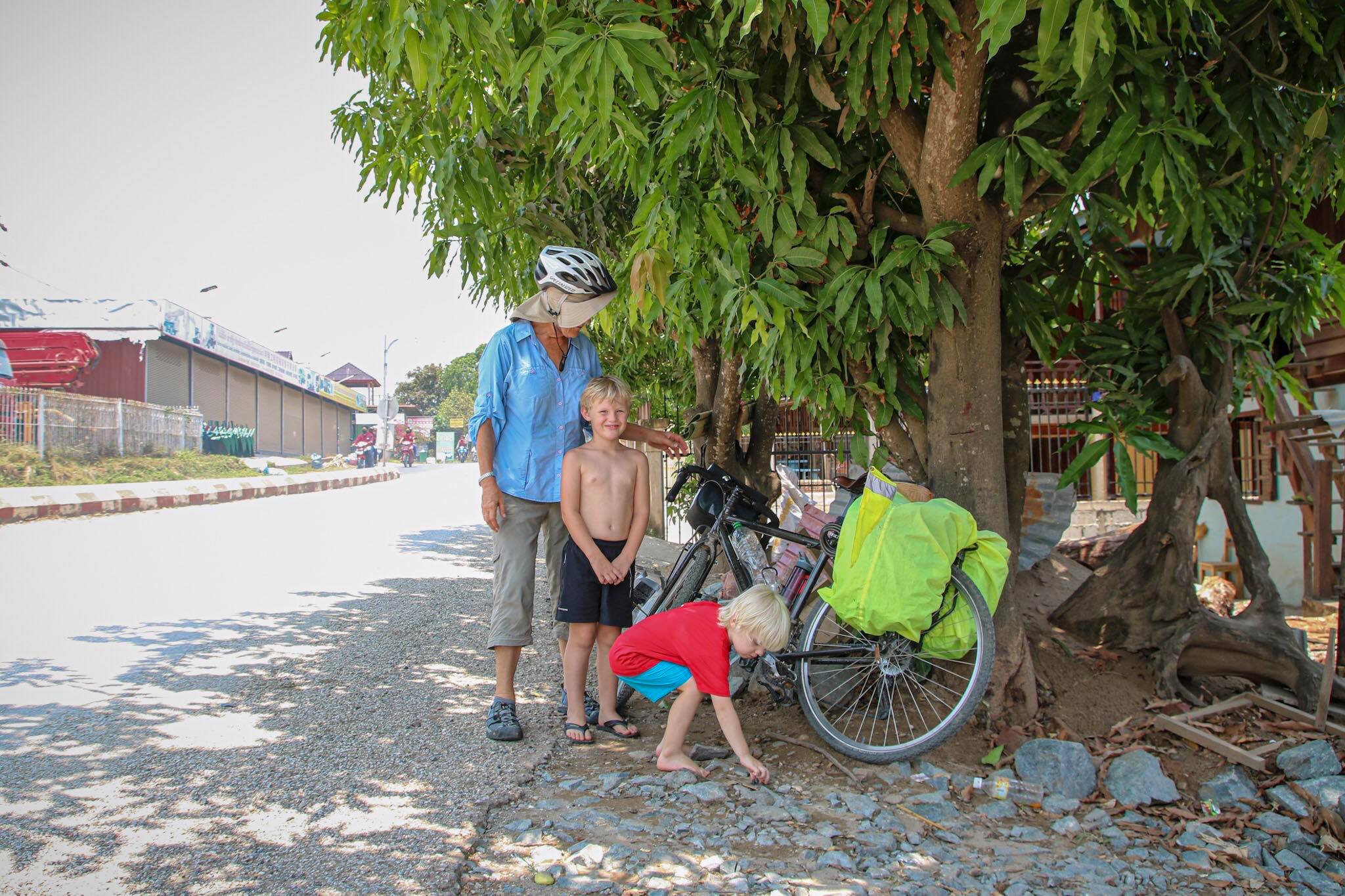
Well, who wouldn’t take fresh heart? It’s a big ask but I value their trust in me: along with Zero Waste Grannies around the world, I’ll give it my best shot.
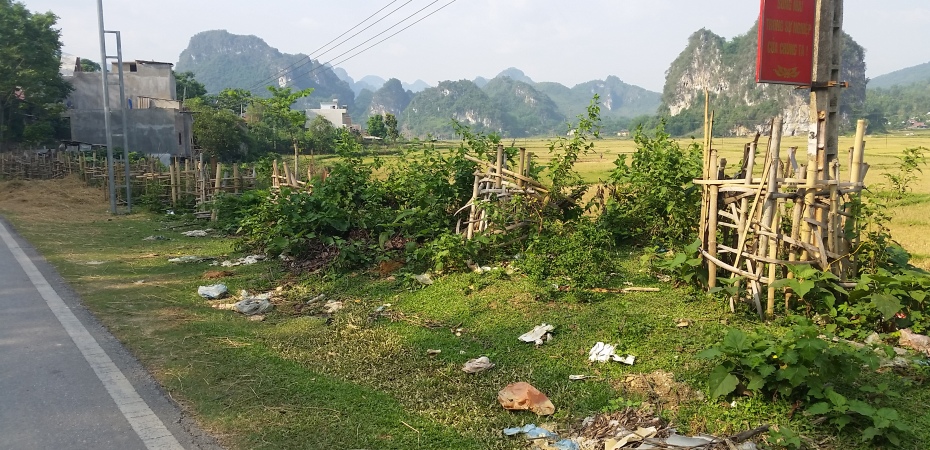
Overwhelmed. That’s how I felt reading you eloquent diary. The beauty of the terrain I can imagine but the plastic pollution is unimaginable and so utterly sad I feel overwhelmed. I have always admired your ability to look beyond and see a positive outcome. The joy of your two grandsons must lift your heavy heart. Well done Jane you brave and courageous Zero Waste Granny. Our nations school children marched for the second time on Friday beseeching our government and its people to stop the plastic pollution and turn to more sustainable ways as part of our our responsibilty to combat our global warming and destruction. I drive my car and know I am part of the problem. But my bike is for rail trail pleasures. To ride it to the Waikato and see my grandchildren and back to Kerikeri is not possible. So I travel Intercity bus. My concession. Go well Jane xx
LikeLike
Thank you for honouring me with these words Judy. I value them. Perhaps we should make that cycle ride to the Waikato a plan to complete together?
LikeLike